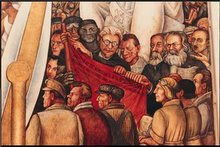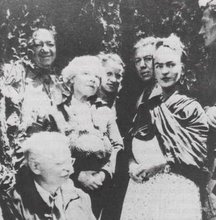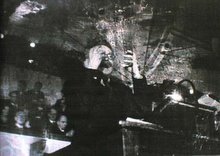REVIEW OF ENGEL’S OCTOBER 1843 ARTICLES “PROGRESS OF SOCIAL REFORM ON THE CONTINENT”. ONLY REVIEW OF PART 1 ON “FRANCE”. (AVAILABLE ON MARXIST INTERNET ARCHIVE).
1. WHY COMMUNISM GREW IN CERTAIN PARTS OF WESTERN EUROPE.
This work by Engels is situated with class conflicts between workers and Capitalists breaking out in Britain and France. In the German states there were a failed Bourgeois revolution against Feudalism and a tiny working class created by beginnings of Industrialisation.
Communism was being accepted by certain radical middle class elements within those German states in the mid-1840s due to them seeing workers struggles in England and prospects of a workers-led revolution in France. This was the atmosphere which led Marx and Engels to come towards Communism. Their importance was that from the late 1840s gave the struggle for workers power and entering ultimately Socialism a scientific (Historical Materialist) basis.
In Britain middle and working class elements were coming to Socialist ideas due to British industrial Capitalism going through periodoric crises. Contradictions within French Capitalism led to sharp class conflicts. This led to Communism gaining a sizeable base among workers. Engels stated in this work that Communism would grow in Western Europe as Capitalism’s contradictions deepened and workers began to assert themselves.
2. MATERIAL BASIS FOR UTOPIAN SOCIALISM (OWENISM) IN BRITAIN.
Bourgeois elements attempting to salvage Capitalism promoted an ideology like Owenism which coned workers that improvements in their conditions could be made by investing in Capitalist firms and by setting up their own companies. The Co-operative movement has been organised along Owenite lines for approximately 200 years.
Churchill in the late 1890s/early1900s argued that the Conservative Party should support workers owning shares in companies they work for. Thatcherism won layers of the Middle Class and Aristocrats of Labour to privatise electricity and gas by gaining certain amounts of money in shares through that process of privatisation. Thatcher called this privatisation process “creating a property owning democracy”.
Blair in the run up to the 1997 General Election tried to continue Thatcherism by calling it “stakeholder society”. Before Labour won that landslide due to the Social Democratic nature of this Party which is in contradiction to his Bourgeois political character, he had to oppose excesses of Thatcherism. This is where the Ultra-Lefts go wrong when they argue Blair has successfully Bourgeoisfied Labour. They in practice reject the Marxist method which sees every process containing internal contradictions. Trotsky’s method of Law of Uneven Combined Development can be applied to Blair which sees his aim to Bourgeoisifly the Labour Party but has not accomplished that.
There is great disappointment with Blairism continuing Thatcherism. Due to this disillusionment with the Labour Party there are dangers of a Tory/Liberal-Democrats coalition government when the next general election is held. Additionally there has been the growth of right wing Populist parties such as the United Kingdom Independence Party (U.K.I.P). The Fascist British National Party (BNP) has been able to make limited electoral gains. This drift to the right in these forms can only be stopped by the Trade Unions fighting in the Labour Party for them to champion more workers interests.
The shift to the left in Latin America and general upturn in world revolution could strengthen the left wing within the Labour Movement and revolutionary forces. One factor which makes a left shift most likely in Britain is that workers won’t tolerate for long Thatcherite policies of Blairism or Tory/Lib Dem coalition government. Workers are at the end of their teather. This is why the mass radicalisation is most likely to deepen and there are great possibilities of pre-revolutionary crises breaking out.
3. ENGELS ON THE DIFFERENCE BETWEEN BRITAIN AND FRANCE WITH ITS TACTICAL IMPLICATIONS.
One of the important points Engels make in this work is due to the instability of French class relations questions are resolved many times by revolution or counter-revolution. Britain in contrast had a long continuity of legal governments without revolution.
There were of course class conflicts and elements of revolutionary upheaval. The British Bourgeoisie managed to stop revolution by staying ahead of the game; and trying to create a mystique of rule by saying that the masses don’t determine anything. This ideology would not have worked on its own. They had to make concessions to elements within the middle and working class. Due to the crisis of Capitalism the British Ruling Class need an assault on previous concessions made to workers and middle class elements.
Apart from Greece; Spain to 1975; and Portugal until 1974 there has been a long period of Bourgeois Democratic rule within Western Europe since the end of World War 2. This democratic space allows revolutionaries to organise workers. Only when Capitalism is seriously threatened in Western Europe will they resort to other forms of rule e.g. military dictatorship or Fascism.
There were oddballs within the British Ruling Class considering a coup against Wilson during the late 1960s/mid-late 1970s. This was a dangerous gamble because Bourgeois rule would have lost its democratic façade. A pre-revolutionary crisis could have broken out due to workers resisting moves to quickly slash their wages and making conditions worse.
In France Engels argued that their attitude to political and social ideas was determined how it influenced political oppression of them by the French ruling class. French workers in his opinion had seen largely through the façade of Bourgeois Democracy and seen its true class character.
Britain in contrast there were large numbers of workers who had tremendous illusions in Bourgeois Democracy; believed conditions could be improved by reform; and looked to Owenism. There were however revolutionary traditions even during that period with upheavals in Oldham and elements of Chartism which were revolutionary. The difference with France was that the class conflict did not reach the pitch of revolution. Revolution, like war clarifies and reveals everything.
The tactical implication of this for Engels was that in France it was easier to make a Socialist revolution. In Britain before a Socialist Revolution workers were more likely have to go through an experience of Bourgeois Democracy and concessions that Capitalists made to workers. Communists would agitate by arguing to workers they can only make gains by organising independently as a class. By taking workers through an experience Communists would show that they could only end their exploitation was through a Socialist revolution.
Engels in this work argues it was best to organise Communists in France through legal organisation. He was in favour of organising underground only as a last resort. This shows that Lenin and Trotsky were correct in fighting Ultra-Lefts within the American Communist Party (CP) who wanted to be underground even when legal conditions were possible. James P. Cannon the American Trotskyist led a fight against such Ultra-Lefts. Lenin and Trotsky finally argued for Cannon’s position. (For further information see Cannon’s (History of American Trotskyism” and “First ten years of American Communism”).
4. ENGELS ON FRENCH WORKERS CLASS INDEPENDENCE WHICH EMERGED OUT OF 1830 REVOLUTION AND ROOTS OF PERMANENT REVOLUTION THEORY.
Engels stated when he wrote this article in October 1843 that in France considerable numbers of workers were looking at ways to end their political oppression. Due to sharpness of class struggles all political currents were tested very quickly. This is why workers broke with forms of Utopian Communism and became more Communist. After the 1830 revolution certain middle class elements desert the workers. This led to a growth of certain class consciousness that they could only have political rights if they organised independently as a class. Engels wrote:
” During this time (1834 or 1835) a new doctrine sprang up among the republican working men. They saw that even after having succeeded in their democratic plans, they would continue [to be] the dupes of their more gifted and better educated leaders, and that their social condition, the cause of their political discontent, would not be bettered by any political change whatsoever. They referred to the history of the great revolution, and eagerly seized upon Babeuf’s Communism. This is all that can, with safety, be asserted concerning the origin of modern Communism in France; the subject was first discussed in the dark lanes and crowded alleys of the Parisian suburb, Saint-Antoine, and soon after in the secret assemblies of conspirators. Those who know more about its origin are very careful to keep their knowledge to themselves, in order to avoid the “strong arm of the law”. However, Communism spread rapidly over Paris, Lyons, Toulouse, and the other large and manufacturing towns of the realm; various secret associations followed each other, among which the “Travailleurs Egalitaires”, or Equalitarian Working Men, and the Humanitarians,"” were the most considerable. The Equalitarians were rather a “rough set”, like the Babouvists of the great revolution; they purposed making the world a working-man’s community, putting down every refinement of civilisation, science, the fine arts, etc., as useless, dangerous, and aristocratic luxuries, a prejudice necessarily arising from their total ignorance of history and political economy. The Humanitarians [158], were known particularly for their attacks on marriage, family, and other similar institutions. Both these, as well as two or three other parties, were very short-lived, and the great bulk of the French working classes adopted, very soon, the tenets propounded by M. Cabet, “Père Cabet” (Father C.), as he is called, and which are known on the continent under the name of Icarian Communism.
This sketch of the History of Communism in France shows, in some measure, what the difference of French and English Communism must be. The origin of Social reform, in France, is a political one; it is found, that democracy cannot give real equality, and therefore the Community scheme is called to its aid. The bulk of the French Communists are, therefore, republicans besides; they want a community state of society, under a republican form of government”
Marxism developed by drawing the lessons of past class struggles. It is also the bridge between theory and practice of class battles; and organises the leadership of workers to overthrow Capitalism. Before a rounded Marxist programme was developed Marxists by developing their theories and strategies were an anticipation of what workers would fight for when they went into struggle in actual practice.
The theory of Permanent Revolution flows from the fact that workers have to rely on their strength; that middle class elements can go over to the Bourgeoisie; and as the population becomes more Proletarian Bourgeois elements fear mobilising the masses. Marx drew the lesson of 1848 when the Bourgeoisie feared mobilising the workers. Due to this they did a deal with the Aristocrats. Marx argued in 1850:
“Although the German workers cannot come to power and achieve the realization of their class interests without passing through a protracted revolutionary development, this time they can at least be certain that the first act of the approaching revolutionary drama will coincide with the direct victory of their own class in France and will thereby be accelerated. But they themselves must contribute most to their final victory, by informing themselves of their own class interests, by taking up their independent political position as soon as possible, by not allowing themselves to be misled by the hypocritical phrases of the democratic petty bourgeoisie into doubting for one minute the necessity of an independently organized party of the proletariat. Their battle-cry must be: The Permanent Revolution.
Marx thought the French workers were strong enough to overthrow Capitalism. In the German states he concluded that Capitalism was not exhausted and would take time for Capitalism’s contradictions to explode into a Socialist revolution.
Trotsky developed the theory further by pointing how Imperialism was dominating Russia back and the only force capable of breaking that stranglehold was the working class. He also drew the same conclusion as Marx that the Bourgeoisie recoiled from mobilising the masses due to the workers weight. Trotsky wrote:
“From the experience of the Hungarian and German revolutions Lassalle drew the conclusion that from now on revolutions could only find support in the class struggle of the proletariat. In a letter to Marx dated 24th October, 1849, Lassalle writes: ‘Hungary had more chances than any other country of bringing its struggle to a successful outcome. Among other reasons this was because the party there was not in a state of division and sharp antagonism as it was in Western Europe; because the revolution, to a high degree, had taken the form of a struggle for national independence. Nevertheless, Hungary was defeated, and precisely as a consequence of the treachery of the national party.’
‘This, and the history of Germany during 1848-49,’ continues Lassalle, ‘brings me to the conclusion that no revolution can be successful in Europe, unless it is from the very first proclaimed to be purely socialistic. No struggle can be successful if social questions enter into it only as a sort of hazy element, and remain in the background, and if it is carried on under the banner of national regeneration or bourgeois republicanism.’
We shall not stop to criticise these very decided conclusions. It is undoubtedly true, however, that already in the middle of the nineteenth century the problem of political emancipation could not be solved by the unanimous and concerted tactics of the pressure of the whole nation. Only the independent tactics of the proletariat, gathering strength for the struggle from its class position, and only from its class position, could have secured victory for the revolution.
The Russian working class of 1906 in no way resembles the workers of Vienna of 1848. The best evidence of this is the springing up all over Russia of the Soviets of Workers’ Deputies. These were not previously-prepared conspirative organizations for the purpose of seizure of power by the workers at the moment of revolt. No, these were organs created in a planned way by the masses themselves for the purpose of co-ordinating their revolutionary struggle. And these Soviets, elected by the masses and responsible to the masses, are unquestionably democratic institutions, conducting a most determined class policy in the spirit of revolutionary socialism.
The social peculiarities of the Russian revolution are particularly evident in the question of the arming of the nation. A militia, the National Guard, was the first demand and the first gain of every revolution, in 1789 and in 1848, in Paris, in all the states of Italy, in Vienna and in Berlin. In 1848 the National Guard, i.e., the arming of the propertied and the ‘educated’ classes, was the demand of the whole of the bourgeois opposition, even of the most moderate, and its object was not only to safeguard the liberties won, or rather, subject to ‘conferment’, against reversals from above, but also to protect bourgeois private property from attacks by the proletariat. Thus the demand for a militia was clearly a class demand of the bourgeoisie. ‘The Italians very well understood’, says the English liberal historian of united Italy, ‘that an armed civil militia would make the further existence of despotism impossible. Besides this it was a guarantee for the propertied classes against possible anarchy and any sort of disorder from below.’[1] And the ruling reaction, not having a sufficient number of troops in the centre of operations to deal with ‘anarchy’, that is with the revolutionary masses, armed the bourgeoisie. Absolutism first allowed the burghers to suppress and pacify the workers and then it disarmed and pacified the burghers.
In Russia the demand for a militia found no support in the bourgeois parties. The liberals cannot help understanding the serious significance of arms; absolutism has given them some object-lessons in this respect. But they also understand the absolute impossibility of creating a militia in Russia apart from or against the proletariat. The Russian workers do not resemble the workers of 1848 who filled their pockets with stones and armed themselves with picks while the shopkeepers, students and lawyers had royal muskets on their shoulders and swords at their sides.
Arming the revolution, in Russia, means first and foremost arming the workers. Knowing and fearing this, the liberals altogether eschew a militia. They even surrender their position to absolutism without a fight just as the bourgeois Thiers surrendered Paris and France to Bismarck simply to avoid arming the workers.
In that manifesto of the liberal-democratic coalition, the symposium called The Constitutional State, Mr. Dzhivelegov, discussing the possibility of revolutions, quite rightly says that ‘Society itself, at the necessary moment, must be prepared to stand up in defence of its Constitution’. But as the logical conclusion from this is the demand for the arming of the people, this liberal philosopher finds it ‘necessary to add’ that ‘it is not at all necessary for everyone to bear arms’[2] in order to prevent reversals. It is only necessary that society itself shall be prepared to offer resistance—in what manner is not indicated. If any conclusion at all can be drawn from this, it is that in the hearts of our democrats the fear of the armed proletariat is greater than the fear of the soldiery of the autocracy.
For that reason the task of arming the revolution falls with all its weight upon the proletariat. The civil militia, the class demand of the bourgeoisie in 1848 is, in Russia, from the very first a demand for the arming of the people and above all for the arming of the proletariat. The fate of the Russian Revolution is bound up with this question”.
Trotskyists recognise that in all revolutions or counter-revolutions the middle class can determine who wins. It is a law of history that the middle class will only support the workers when they stage a decisive struggle for power. In a crisis unless that happens they will fall under Bourgeois leadership.
Sunday, 11 February 2007
Subscribe to:
Posts (Atom)


